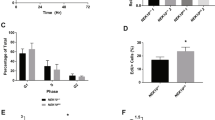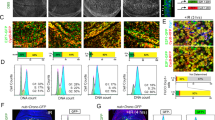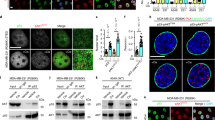Abstract
Damage to DNA in the cell activates the tumour-suppressor protein p53 (ref. 1), and failure of this activation leads to genetic instability and a predisposition to cancer. It is therefore crucial to understand the signal transduction mechanisms that connect DNA damage with p53 activation. The enzyme known as DNA-dependent protein kinase (DNA-PK) has been proposed to be an essential activator of p53 (refs 2, 3), but the evidence for its involvement in this pathway is controversial3,4. We now show that the p53 response is fully functional in primary mouse embryonic fibroblasts lacking DNA-PK: irradiation-induced DNA damage in these defective fibroblasts induces a normal response of p53 accumulation, phosphorylation of a p53 serine residue at position 15, nuclear localization and binding to DNA of p53. The upregulation of p53-target genes and cell-cycle arrest also occur normally. The DNA-PK-deficient cell line SCGR11 contains a homozygous mutation in the DNA-binding domain of p53, which may explain the defective response by p53 reported in this line3. Our results indicate that DNA-PK activity is not required for cells to mount a p53-dependent response to DNA damage.
This is a preview of subscription content, access via your institution
Access options
Subscribe to this journal
Receive 51 print issues and online access
$199.00 per year
only $3.90 per issue
Buy this article
- Purchase on Springer Link
- Instant access to full article PDF
Prices may be subject to local taxes which are calculated during checkout



Similar content being viewed by others
References
Levine, A. J. p53, the cellular gatekeeper for growth and division. Cell 88, 323–331 (1997).
Prives, C. Signaling to p53: breaking the MDM2–p53 circuit. Cell 95, 5–8 (1998).
Woo, R. A., McLure, K. G., Lees-Miller, S. P., Rancourt, D. E. & Lee, P. W. DNA-dependent protein kinase acts upstream of p53 in response to DNA damage. Nature 394, 700–704 (1998).
Smith, G. C. & Jackson, S. P. The DNA-dependent protein kinase. Genes Dev. 13, 916–934 (1999).
Taccioli, G. E. et al . Targeted disruption of the catalytic subunit of the DNA-PK gene in mice confers severe combined immunodeficiency and radiosensitivity. Immunity 9, 355–366 (1998).
Giaccia, A. J. & Kastan, M. B. The complexity of p53 modulation: emerging patterns from divergent signals. Genes Dev 12, 2973–2983 (1998).
Lees-Miller, S. P., Sakaguchi, K., Ullrich, S. J., Appella, E. & Anderson, C. W. Human DNA-activated protein kinase phosphorylates serines 15 and 37 in the amino-terminal transactivation domain of human p53. Mol. Cell. Biol. 12, 5041–5049 (1992).
Tibbetts, R. S. et al . Arole for ATR in the DNA damage-induced phosphorylation of p53. Genes Dev. 13, 152–157 (1999).
Jeggo, P. A. DNA-PK: at the cross-roads of biochemistry and genetics. Mutat. Res. 384, 1–14 (1997).
Hainaut, P. et al . Database of p53 gene somatic mutations in human tumors and cell lines: updated compilation and future prospects. Nucleic Acids Res. 25, 151–157 (1997).
Rathmell, W. K., Kaufmann, W. K., Hurt, J. C., Byrd, L. L. & Chu, G. DNA-dependent protein kinase isnot required for accumulation of p53 or cell cycle arrest after DNA damage. Cancer Res. 57, 68–74 (1997).
Nussenzweig, A. et al . Requirement for Ku80 in growth and immunoglobulin V(D)J recombination. Nature 382, 551–555 (1996).
Huang, L. C., Clarkin, K. C. & Wahl, G. M. p53-dependent cell cycle arrests are preserved in DNA-activated protein kinase-deficient mouse fibroblasts. Cancer Res. 56, 2940–2944 (1996).
Gu, Y. et al . Growth retardation and leaky SCID phenotype of Ku70-deficient mice. Immunity 7, 653–665 (1997).
Zhu, C., Bogue, M. A., Lim, D. S., Hasty, P. & Roth, D. B. Ku86-deficient mice exhibit severe combined immunodeficiency and defective processing of V(D)J recombination intermediates. Cell 86, 379–389 (1996).
Jongmans, W. et al . The role of ataxia telangiectasia and the DNA-dependent protein kinase in the p53-mediated cellular response to ionising radiation. Oncogene 13, 1133–1138 (1996).
Linke, S. P., Clarkin, K. C., Di Leonardo, A., Tsou, A. & Wahl, G. M. Areversible, p53-dependent G0/G1 cell cycle arrest induced by ribonucleotide depletion in the absence of detectable DNA damage. Genes Dev. 10, 934–947 (1996).
Sakaguchi, K. et al . DNA damage activated p53 through a phosphorylation–acetylation cascade. Genes Dev. 12, 2831–2841 (1998).
McLure, K. G. & Lee, P. W. How p53 binds DNA as a tetramer. EMBO J. 17, 3342–3350 (1998).
Acknowledgements
We thank R. S. Haltiguanger and S. Tronick for help with Ab421 coupling. This work was supported by the MRC (A.P., P.A.J.), by a postdoctoral fellowship from the NIH (G.S.J.), by grants from the NIH and from the G. Harold and Leila Y. Mathers Charitable Foundation (G.M.W. and M.B.), in part by the Wellcome Trust, by the Human Frontiers Science Program (F.B.), and in part by the Leukemia Society of America and by a grant from the National Cancer Institute, NIH (G.E.T.). M.H. is an R.M. Phillips senior research fellow; G.E.T. is a scholar of the Leukemia Society of America.
Author information
Authors and Affiliations
Corresponding author
Rights and permissions
About this article
Cite this article
Jimenez, G., Bryntesson, F., Torres-Arzayus, M. et al. DNA-dependent protein kinase is not required for the p53-dependent response to DNA damage. Nature 400, 81–83 (1999). https://doi.org/10.1038/21913
Received:
Accepted:
Issue Date:
DOI: https://doi.org/10.1038/21913
This article is cited by
-
ATM, DNA-PKcs and ATR: shaping development through the regulation of the DNA damage responses
Genome Instability & Disease (2020)
-
Induction and inhibition of the pan-nuclear gamma-H2AX response in resting human peripheral blood lymphocytes after X-ray irradiation
Cell Death Discovery (2016)
-
Dietary nitrogen and fish welfare
Fish Physiology and Biochemistry (2012)
-
Maternal effects of the scid mutation on radiation-induced transgenerational instability in mice
Oncogene (2007)
Comments
By submitting a comment you agree to abide by our Terms and Community Guidelines. If you find something abusive or that does not comply with our terms or guidelines please flag it as inappropriate.



